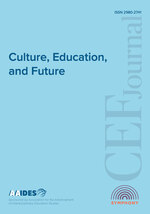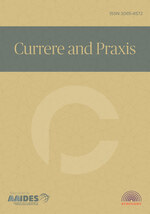Assessing the NPST effectiveness in Pakistan’s primary teacher training and professional development: A theoretical and empirical examination
Keywords:
National Professional Standards for Teachers (NPST), teacher professional development, self-efficacy, classroom practices, contextual challengesAbstract
This qualitative study explores the efficacy of the National Professional Standards for Teachers (NPST) in primary-level teacher training in Pakistan, using Social Cognitive Theory and Constructivist Learning Theory as the theoretical framework. The research aims to understand how primary school teachers perceive and implement NPST standards in their classrooms, with a focus on their self-efficacy, prior knowledge, and contextual factors influencing their professional development. Data were collected through in-depth interviews with 10 primary school teachers from the urban and rural regions of District Muzaffargarh Pakistan. The findings highlight that while NPST training has positively influenced teachers’ confidence and teaching practices, its application is significantly shaped by external factors such as school resources, peer collaboration, and administrative support. Teachers with higher self-efficacy demonstrated more significant success in applying NPST strategies, whereas those in resource-constrained environments struggled to implement the standards fully. The study contributes to the literature by offering insights into the lived experiences of teachers and the contextual challenges they face in translating NPST training into practice. The findings underscore the need for tailored professional development programs that address both internal teacher beliefs and external environmental factors to enhance the effectiveness of NPST in diverse educational settings.
References
Ahmad, S., Ali, A., & Ashraf, M. (2024). A review of classroom assessment practices with special reference to national professional standards for teachers in Peshawar (Pakistan). Journal of Asian Development Studies, 13(1), 305-318. https://doi.org/10.62345/jads.2024.13.1.26
Altaf, F., Hashmi, A., Khan, S., & Habib, M. (2022). A Study of national professional standards for ESL teachers at primary level. Webology, 19(2), 5495–5507. Retrieved from http://www.webology.org/abstract.php?id=2007
Arif, M., Ismail, A., Shaoan, M. M. R., & Namanyane, T. (2024). Barriers and resilience: The impact of early marriage on girls’ education in Balochistan. Culture, Education, and Future, 2(2), 200–216. https://doi.org/10.70116/2980274129
Arif, M., Ismail, A., & Irfan, S. (2025a). AI-powered approaches for sustainable environmental education in the digital age: A study of Chongqing International Kindergarten. International Journal of Environment, Engineering and Education, 7(1), 35–47. https://doi.org/10.55151/ijeedu.v7i1.184
Arif, M., Ismail, A., Aqib, M., Shaoan, M. M. R., Ali, W., & Okafor, M. U. (2025b). The impact of AI-driven tools on foreign students’ Chinese language acquisition: A case study at Southwest University. Language, Technology, and Social Media, 3 (1), 150–168.
Bandura, A. (1986). Social Foundations of Thought and Action: A Social Cognitive Theory. Prentice-Hall.
Bird, J., & Charteris, J. (2020). Teacher performance assessments in the early childhood sector: wicked problems of regulation. Asia-Pacific Journal of Teacher Education, 2(2), 1–14. https://doi.org/10.1080/1359866x.2020.1843596
Brown, C., White, R., & Kelly, A. (2021). Teachers as educational change agents: what do we currently know? findings from a systematic review. Emerald Open Research, 3(4), 26. https://doi.org/10.35241/emeraldopenres.14385.1
Burgess, S., Rawal, S., & Taylor, E. S. (2022). Teachers’ Use of Class Time and Student Achievement. SSRN Electronic Journal, 1(8). https://doi.org/10.2139/ssrn.4288519
Choudhary, H. (2025). From margins to mainstream: Paving the way to digital equity through digital literacy training programs. Evaluation and Program Planning, 109(2), 102533. https://doi.org/10.1016/j.evalprogplan.2024.102533
Braun, V., & Clarke, V. (2022). Conceptual and design thinking for thematic analysis. Qualitative Psychology, 9(1), 3–26. https://doi.org/10.1037/qup0000196
Braun, V., & Clarke, V. (2020). One Size Fits all? What Counts as Quality Practice in (reflexive) Thematic analysis? Qualitative Research in Psychology, 18(3), 328–352. https://doi.org/10.1080/14780887.2020.1769238
Busetto, L., Wick, W., & Gumbinger, C. (2020). How to Use and Assess Qualitative Research Methods. Neurological Research and Practice, 2(1), 1–10. https://doi.org/10.1186/s42466-020-00059-z
Byrne, M. (2021). Interviewing as a data collection method. AORN Journal, 74(2), 233–235. https://doi.org/10.1016/s0001-2092(06)61533-0
Dahlin, E. (2021). Email interviews: A guide to research design and implementation. International Journal of Qualitative Methods, 20 (2). https://doi.org/10.1177/16094069211025453
Darling-Hammond, L. (2000). Teacher quality and student achievement: A review of state policy evidence. Educational Policy Analysis Archives, 8(1), 1–44.
Darr, C. (2020). Developing insights about student learning: Lessons from the National Monitoring Study of Student Achievement. Set: Research Information for Teachers, 1(1). https://doi.org/10.18296/set.0163
Doering, E. L., & Cooper, B. R. (2022). Media review: Qualitative comparative analyses in mixed methods research and evaluation. Journal of Mixed Methods Research, 3 (6), Article 155868982211256. https://doi.org/10.1177/15586898221125636
Espinosa Andrade, A., Padilla, L., & Carrington, S. J. (2024). Educational spaces: The relation between school infrastructure and learning outcomes. Heliyon, 10(19), e38361. https://doi.org/10.1016/j.heliyon.2024.e38361
Greenland, S. J., & Moore, C. (2021). Large qualitative sample and thematic analysis to redefine student dropout and retention strategy in open online education. British Journal of Educational Technology, 53(3). https://doi.org/10.1111/bjet.13173
Ismail, A., Jamil, R., Abbas, S. T., Arif, M., Wang, Y., & Weihong, W. (2024). Discrimination and social exclusion among Afghan refugees in Pakistan: Challenges and solutions. International Journal of Contemporary Issues in Social Sciences (IJCISS), 3 (2), 354. Retrieved from https://ijciss.org/index.php/ijciss/article/view/643
Kiely, R., & Hartman, E. (2023). Qualitative research methodology and international service learning. Routledge eBooks, 3 (2), 291–317. https://doi.org/10.4324/9781003445371-16
Li, L., & Ruppar, A. (2020). Conceptualizing Teacher Agency for Inclusive Education: A Systematic and International Review. Teacher Education and Special Education: The Journal of the Teacher Education Division of the Council for Exceptional Children, 44(1), 088840642092697. https://doi.org/10.1177/0888406420926976
Menon, D., Wieselmann, J. R., Haines, S., & Asim, S. (2024). A Meta-Synthesis of the Literature on Science & Engineering Teaching Self-Efficacy: Current Gaps and Future Research Directions. Journal of Science Teacher Education, 35(5), 480–503. https://doi.org/10.1080/1046560x.2023.2297499
Ministry of Education. (2018). National Professional Standards for Teachers. Government of Pakistan.
Murtaza, K. G., & Hui, L. (2021). Higher Education in Pakistan: Challenges, Opportunities, Suggestions. Education Quarterly Reviews, 4(2). https://doi.org/10.31014/aior.1993.04.02.211
Pantić, N., Galey, S., Florian, L., Joksimović, S., Viry, G., Gašević, D., Knutes Nyqvist, H., & Kyritsi, K. (2021). Making sense of teacher agency for change with social and epistemic network analysis. Journal of Educational Change, 23(2). https://doi.org/10.1007/s10833-021-09413-7
Piaget, J. (1970). Science of Education and the Psychology of the Child. Viking Press.
Qaisra, R., & Haider, S. Z. (2023). The Influence of In-Service Teachers Training Programs on the Professional Development of School Teachers. Pakistan Journal of Humanities and Social Sciences, 11(1), 507–516. https://doi.org/10.52131/pjhss.2023.1101.0368
Qureshi, N., & Kalsoom, Q. (2022). Teacher Education in Pakistan: Structure, Problems, and Opportunities. Handbook of Research on Teacher Education,(pp. 971–986) Springer. https://doi.org/10.1007/978-981-16-9785-2_50
Reños, G., & Pontillas, P. (2024). Classroom Observation and Teachers’ Professional Development Activities: Basis for Intervention Plan. American Journal of Arts and Human Science, 3(3), 71–93. https://doi.org/10.54536/ajahs.v3i3.3077
Roberts, C., Khanna, P., Lane, A. S., Reimann, P., & Schuwirth, L. (2021). Exploring complexities in the reform of assessment practice: a critical realist perspective. Advances in Health Sciences Education, 2(2). https://doi.org/10.1007/s10459-021-10065-8
Romblon, J., Marie, S., & Solis, L. C. (2023). Classroom Challenges Encountered by Pre-Service Science Teachers from Abuyog Community College. SSRN Electronic Journal, 2(2). https://doi.org/10.2139/ssrn.4602198
Santos, J., & Castro, R. D. R. (2020). Technological Pedagogical Content Knowledge (TPACK) in Action: Application of Learning in the Classroom by Pre-Service Teachers (PST). SSRN Electronic Journal, 2(2). https://doi.org/10.2139/ssrn.3661054
Schön, D. A. (1987). Educating the Reflective Practitioner. Jossey-Bass.
Ullah, S., Mazhar, S., & Iqbal, M. (2023). Investigation of teachers’ competencies through National Professional Standards for Teachers in Pakistan. Journal of Development and Social Sciences, 4(1), 1–13. https://doi.org/10.47205/jdss.2023(4-I)01
Vygotsky, L. S. (1978). Mind in Society: The Development of Higher Psychological Processes. Harvard University Press.
Zeynep, W., & Eveyik-Aydın, E. (2022). Perspectives of EFL teacher trainers and pre-service teachers on continued mandatory distance education during the pandemic. Teaching and Teacher Education, 112(2), 103635. https://doi.org/10.1016/j.tate.2022.103635
Downloads
Published
How to Cite
Issue
Section
License
Copyright (c) 2025 Symphony

This work is licensed under a Creative Commons Attribution 4.0 International License.









